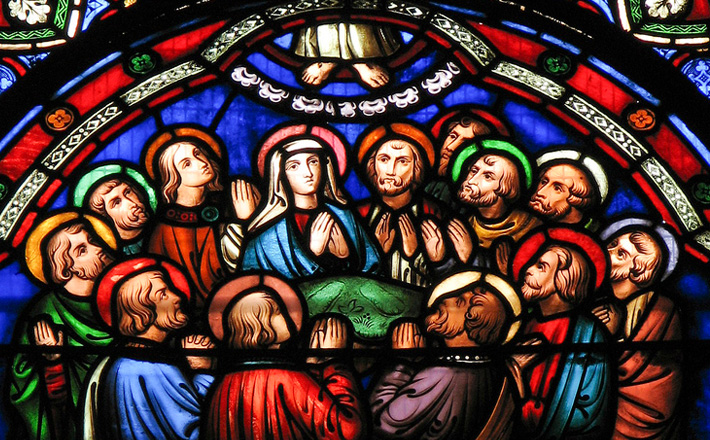Commentary on 1 Peter 4:12-14; 5:6-11
The “living hope” that belongs to the good news of Christ’s resurrection even in the midst of persecution and suffering that marked the theme of last Sunday’s reading from the opening verses of 1 Peter still undergirds and shapes the reading for today which stands at the conclusion of this letter.
As readers and hearers who stand now at the last Sunday of Easter, it is perhaps fitting to take a few moments to reflect on Christian faith and life from the perspective of the end time. Even in the midst of waiting, and even in the midst of a world that seems so contrary and adversarial to the commitments and attitudes that belong to the people of God, there is reason for confidence in God’s promises. We are still an Easter people who are sustained and encouraged by the hope that, whatever comes, God has joined us to the suffering and victory of Christ, whom God has raised from the dead.
“Since Christ has suffered in the flesh … ” Chapter 4 of 1 Peter begins with this foundational premise, and then draws the implied conclusion: so “arm yourselves” by keeping that insight as a guide for life in this world. As noted in last Sunday’s comments, it is very clear that what occupies the mind of this community is the very real experience of suffering (signaled by the fact that 1 Peter has twelve uses of the verb “suffer” out of only 42 in the whole New Testament).
It is instructive that the author does not avoid or play down the issue, but addresses it squarely by acknowledging that the community’s suffering is real. At the same time, the author provides a perspective and builds confidence by encouraging the hearers to view that suffering through the lens of a crucial reminder.
Christ also suffered. That remembrance joins this community to Christ and to the realization that for those who bear the name of Christ suffering should not come as a shock. Today’s reading in fact picks up with that advice. Don’t be surprised at the “fiery ordeal” that belongs to this present earthly life, “as though something strange were happening to you” (4:12). The testing of suffering in this earthly life will reveal whether this community will spend their time following their passions or instead use the gifts that have been given them in the exercise of love and hospitality for one another (4:3-11).
Thus, far from being a matter for lament or surprised anxiety, suffering is rather an occasion for rejoicing, because it is a sign that they are sharing in the sufferings of Christ (4:13). To suffer is to be joined in a special way to the resurrected Lord Jesus. In fact that author can speak of suffering as essentially the name tag of identity on which is inscribed the name of Christ. To suffer is what it means to walk around in this life with the name of Christ as the mark of identity.
To bear this name is not a mark of sadness or shame; this name is indeed what constitutes their “blessing” (4:14). The mistreatment of those who revile or persecute them because they bear the name of Christ is in fact the blessing of God that assures them that the spirit of God is “resting upon you.”
Such a perspective belongs to a people who are encouraged to see themselves as standing at the end of time. 1 Peter as a whole speaks from that perspective: “the end of all things is near; therefore be serious and discipline yourselves” (4:7). It might not always be easy for us to share that perspective, especially when it is now some two thousand years later, and the end has not yet come.
At the same time, as we stand at this last Sunday of Easter, it might be worthwhile to reflect on how we might live our lives differently should we really believe that the world in which we live is not so hospitable a place, and should we really long for an end to present suffering to be exchanged for the blessings of God’s promise of victory in the resurrection of our Lord.
1 Peter speaks of maintaining a sense of seriousness and discipline in the meantime before the end (4:7). That discipline is reflected in the series of commands and encouragement that characterize the last verses of today’s reading (5:6-11). Though not explicitly stated, it seems to be no accident, and the student of the New Testament witness will recognize in their content themes that are an imitative reflection of the teaching of Jesus in the gospels.
Not only is Jesus’ suffering an occasion for encouragement, but the words of Jesus also provide a companion and guide for the living of life in the meantime of waiting. The community is exhorted to live in humility. (“Humble yourselves so that God may exalt you in due time;” cf. Matthew 23.12). They are encouraged not to be anxious when reminded always that God keeps them in love and care (“Cast all your cares on him because he cares for you;” cf. Matthew 6.25f.). They are called to “keep awake” in a sober and disciplined life (cf. Matthew 24.42: “Keep awake, for you do not know on what day your Lord is coming”).
The warning to watch out for the devil, who prowls around waiting to attack them, well recalls the temptation accounts of Jesus (cf. Matthew 4.1-11). Finally, the charge to resist the wiles of the evil one and to recall the brothers and sisters who undergo the same kind of suffering as they do recalls Jesus’ encouragement to pray — “Deliver us from the evil one” — and to engage in intercessory prayer on behalf of the community of believers (cf. Matthew 6.9; 18.18-22).
The final word of encouragement, indeed, as it were the final words of this epistle are the reminder that the “God of grace has called you” (5:10). In the perspective of God’s grace, the author encourages, the time of suffering is only for a little while. God’s grace and the promise of the resurrection is forever.
As in last Sunday’s reading the last word is about power. In the end the power of God has the last word. The concluding words, “To him belongs power forever!” (5:11), sounds much like the familiar doxology of the Lord’s Prayer. They commend themselves in much the same way as perspective and framework for the living of each of our days. Whatever happens in this life, God’s promises revealed in the glory of Christ and his resurrection are sure. God will continue to restore with creative gifts, to establish us firmly when we stumble, to give strength in times of weakness, and to build us up on the firm foundation of the community of faith (5:10).


June 1, 2014